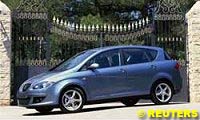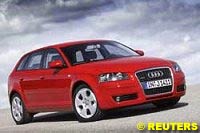

Automotive News and Reviews for the Petrolhead
In this week's issue:
- Car Briefs
- DaimlerChrysler Workers Agree Cuts
- Fiat Claws to Operating Profit
One noteworthy feature for a car in this class is Bluetooth technology, which allows an integrated hands-free phone system to be operated by multi-function buttons in the steering wheel. The audio system also offers a slot at the top for standard or MP3 format CDs.
The engine line-up is made up of two petrol engines - 102 bhp 1.6 and 150 bhp 2.0 FSI plus two diesel ones - 105 bhp 1.9 and 140 bhp 2.0 TDI. The 2.0 litre engines are combined with a six-speed manual gearbox. In addition, the FSI will be available with automatic and sequential Tiptronic 6-speed gearbox. The 2.0 TDI will have the option of the new DSG 6-speed gearbox.
Safety equipment includes traction and stability control systems, emergency brake assistance, six airbags and three-point seatbelts for all five seats, with pyrotechnic pre-tensioners at the front and the Isofix system for securing child seats integrated in the back seats.
Meanwhile VW has cut its forecast profit for 2004 from €2.5 billion to €1.9 billion due to lower than expected profits from the Golf and the cost of the strong Euro. In Germany, VW has had to give incentives, such as free air conditioning, on the Golf and North American profits are suffering from the weak dollar.
The Sportback is 7cm longer than the three door and is claimed to have more rear space along with a boot that has expanded by 20 litres to a total of 1120 litres. Equipment is identical to the equivalent three door models, except that all Sportbacks get rear electric windows as standard. The one technical development is a new 2.0 Turbo FSI engine that will gradually be fitted across a number of Audi models. The engine produces 200 bhp; enough to accelerate the Sportback to 62mph in 7.1 seconds and provide a top speed of 146mph.
Ford has reported a better second quarter, with profit doubling to $1.2 billion. However, the company is not out of the woods yet. Two-thirds of the profit came from Ford Credit (financing cars can be a lot more profitable than making them), but the Premier Automotive Group (Aston Martin, Jaguar, Land Rover, Volvo) lost $360 million. Given that Volvo is thought to be highly profitable and Aston Martin is too small to make much difference, some hard questions are being asked of Jaguar and Land Rover.
In Europe, Ford is also doing a bit better. Profits for the quarter were $210 million, helped by the new Focus C-Max which has got off to a very strong start. However, costs will rise at the end of the year when Ford gears up for the all-important new Focus, so a full-year profit is still not guaranteed.
Employees at DaimlerChrysler have agreed to work longer hours and give up perks to secure 6,000 jobs in Germany in a deal that will save 500 million euros (332 million pounds) a year from 2007.
German Chancellor Gerhard Schroeder greeted DaimlerChrysler's agreement with the IG Metall union as "a victory for common sense" that would strengthen Germany's economic recovery and set a precedent for talks at rival car maker Volkswagen.
"I am certain that after DaimlerChrysler the negotiations at Volkswagen over cost cuts and job security will lead to a successful agreement," Schroeder, who is on holiday in Italy, said in a statement on Friday.
DaimlerChrysler said the deal, struck after weeks of talks that saw output disrupted during protests by employees, would help luxury unit Mercedes to grow profitably and guarantee production in Germany until 2012.
"The agreement sets the course for increased productivity and efficiency and so strengthens the long-term competitiveness of the Mercedes car group," Mercedes chief Juergen Hubbert said, adding the group would make up production lost.
The accord followed 16 hours of talks between management, the company's works council and IG Metall, and heads off the threat of further demonstrations planned at Mercedes plants across the country for Friday.
Managers
Over 60,000 employees took part in nationwide protests last week, incensed that they were being asked to make sacrifices while senior DaimlerChrysler management appeared untouched by the group's problems at Chrysler in the United States and its Japanese partner, Mitsubishi.
In a conciliatory gesture, DaimlerChrysler's management board agreed to take a cut of 10 percent in overall remuneration, while 3,000 managers in Germany will also have their packages reduced as part of the cost-cutting programme. The dispute centred on DaimlerChrysler's home state of Baden-Wuerttemberg, where workers enjoyed better terms and conditions than at other plants in Germany.
Mercedes had threatened to move production of the new version of its C-class saloon from Sindelfingen, near the group's Stuttgart headquarters, to works at Bremen in northern Germany and East London in South Africa, threatening 6,000 jobs.
The deal includes a 50 percent cut in hourly breaks enjoyed by workers in Baden-Wuerttemberg and the implementation of a 40-hour working week in all development and planning departments.
It will also see the introduction of a single pay structure for production and office staff and greater flexibility in adjusting employment levels by assigning young skilled workers and temporary workers to an internal employment agency.
The carmaker's productivity plan follows a similar move by manufacturing and technology giant Siemens, which recently won employee agreement to increase working hours at two German works without extra pay.
Fiat clawed its way to an operating profit in the second quarter and confirmed its 2004 targets on Monday, but its core carmaker posted a worse than expected loss due to still sluggish sales and a strike.
In a statement, Fiat said it made a group operating profit of 18 million euros ($22 million), slightly higher than the 12 million euros median forecast in a Reuters poll of 11 analysts last week and a loss of 25 million a year ago. But Fiat Auto, which dragged the 105-year-old company into its worst crisis in 2002, continued to struggle and posted a loss of 282 million euros, worse than the 180 million expected by analysts. It lost 234 million euros in the year-ago period.
"They aren't great quarterly results and some numbers came in worse than expected. But they have started to clean up the balance sheet and have reiterated the 2004 breakeven target yet again. The market expected a nastier surprise," one trader said.
Others said the stock was reacting to an improvement in Fiat's net debt which stood at 4.25 billion euros at end-June against 4.41 billion at the end of the first quarter, partly due to an increase in trade receivables which cut its working capital requirements.
Marchionne has said he wants to speed up a recovery plan drawn up by his predecessor, which sees Fiat Auto breaking even at operating level in 2005, when the group should pull even at net and cash flow level.
Car Sales Still Sluggish
Fiat said it would keep to the former plan to cut costs and improve margins and hoped that new models across its bulldozer to bus range will help foster growth in the second half. However, despite launching four new cars recently, Fiat Auto's revenues rose only 2.6 percent year-on-year in the second quarter while in unit sales they were only 2 percent higher.
Fiat put some of that down to a three-week strike at the Melfi plant which brought most of its Italian factories to a halt in April and lost production of about 40,000 cars. The strike was also blamed for Fiat Auto's wider loss, along with a policy of cutting dealer inventories and higher research and development costs.
Fiat, which sells most of its cars in Western Europe, said it should benefit from any recovery in the European economy in the second half but added that competition was very tough. The European market for heavier vehicles has picked up this year, helping truck unit Iveco to an operating profit of 102 million euros from 20 million a year earlier.
But the jewel in Fiat's crown over the last years, sportscar unit Ferrari, made an operating loss of 12 million euros, due to a strong euro and high development costs at its Maserati marque. Sales rose 17 percent, helped by the new Maserati Quattroporte.
![]() Car Briefs
Car Briefs
 Seat has announced first details of the third-generation Toledo, which will go on sale in right-hand-drive form in early 2005. The new Toledo is taking a new approach for a car in the Mondeo class: a semi-MPV look that gives lots of space without losing the handling characteristics of a conventional hatchback.
Seat has announced first details of the third-generation Toledo, which will go on sale in right-hand-drive form in early 2005. The new Toledo is taking a new approach for a car in the Mondeo class: a semi-MPV look that gives lots of space without losing the handling characteristics of a conventional hatchback.
 General Motors has reported second-quarter profits of $1.3bn, up from $875m this time last year. That sounds pretty good, but it was on turnover of $49.1bn, meaning a profit margin of 2.6%, which is hardly spectacular. In fact profits on actual car manufacturing were just $333m: as with Ford, GM is making most of its money from car finance. In Europe, GM lost $45 million. GM's CEO, Rick Waggoner, promised more new models and more cost reductions in Europe to try and achieve sustainable profits.
General Motors has reported second-quarter profits of $1.3bn, up from $875m this time last year. That sounds pretty good, but it was on turnover of $49.1bn, meaning a profit margin of 2.6%, which is hardly spectacular. In fact profits on actual car manufacturing were just $333m: as with Ford, GM is making most of its money from car finance. In Europe, GM lost $45 million. GM's CEO, Rick Waggoner, promised more new models and more cost reductions in Europe to try and achieve sustainable profits.
 Audi has announced prices for the new five door version of the A3 - to be called Sportback. There will be a £500 premium over the equivalent three door and the first deliveries will take place in September 2004.
Audi has announced prices for the new five door version of the A3 - to be called Sportback. There will be a £500 premium over the equivalent three door and the first deliveries will take place in September 2004.
![]() DaimlerChrysler Workers Agree Cuts
DaimlerChrysler Workers Agree Cuts
![]() Fiat Claws to Operating Profit
Fiat Claws to Operating Profit
| Contact the Editor |
© 1995-2005 Kaizar.Com, Inc. . This service is provided under the Atlas F1 terms and conditions.
|
Volume 10, Issue 30
Atlas F1 Exclusive
Interview with John Iley
Bjorn Wirdheim: Going Places
Ann Bradshaw: Point of View
2004 German GP Review
2004 German GP Review
Technical Review: Germany 2004
Raising the BAR (Part III)
A Wing and a Prayer
Stats Center
Qualifying Differentials
SuperStats
Charts Center
Columns
The F1 Insider
Season Strokes
On the Road
Elsewhere in Racing
> Homepage |